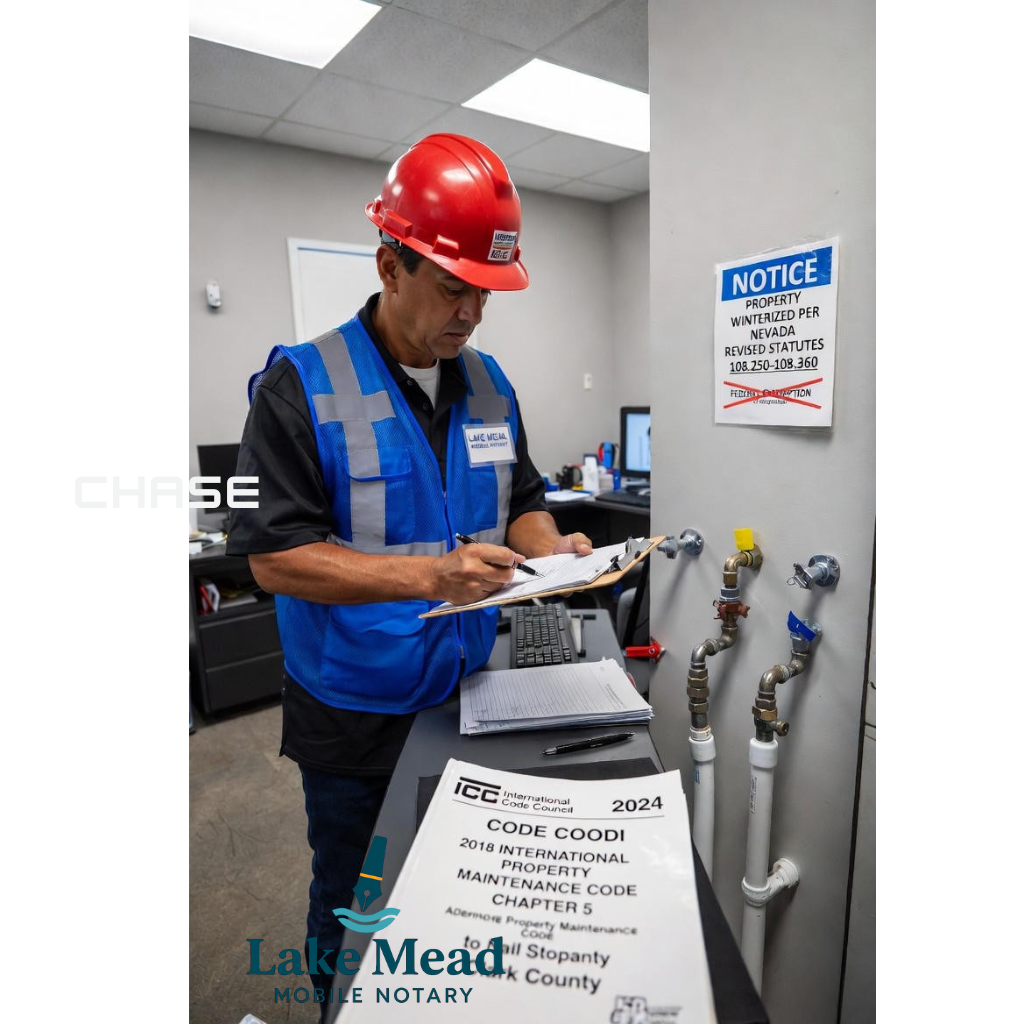Nevada Winterization Confusion: Federal Exemption Does Not Override Local Building Codes
Nevada appears on federal winterization exempt state lists maintained by USDA (revised October 1, 2025) and Fannie Mae due to moderate climate conditions relative to extreme cold weather states. However, Clark County's adoption of 2024 International Building Code effective January 11, 2026 creates mandatory local winterization requirements for foreclosed and vacant properties throughout Las Vegas, Henderson, North Las Vegas, and unincorporated Clark County areas.
Property preservation vendors and mortgage servicers relying solely on federal exemption status without implementing Clark County winterization protocols risk code violations, property damage liability, and potential investor servicing guide breaches when local building inspectors enforce 2024 ICC requirements. This creates a compliance gap where servicers must navigate conflicting federal guidelines and local building code mandates across Nevada communities including Spring Valley, Paradise, and Boulder City.
Federal Winterization Exemption: USDA and Fannie Mae Guidelines
USDA Rural Development and Fannie Mae maintain winterization exemption lists identifying states where federal agencies do not mandate routine winterization activities for foreclosed properties. Nevada qualifies for federal exemption based on climate data showing limited freeze risk compared to northern and midwest states experiencing sustained sub-freezing temperatures throughout winter months.
Federal exemption means USDA and Fannie Mae do not automatically require winterization activities for Nevada foreclosure properties under federal servicing guidelines. However, federal exemption explicitly does not override local building codes, municipal ordinances, or investor-specific servicing guide requirements mandating winterization regardless of federal exemption status.
Clark County 2024 ICC Mandatory Winterization Requirements
Clark County's 2024 International Building Code adoption creates local winterization mandates superseding federal exemptions for all foreclosed and vacant properties within Clark County jurisdiction. Required winterization activities under 2024 ICC include:
- Freeze Protection for Plumbing Systems: Drain lines, supply lines, and fixtures in vacant properties during heating season (October 15 through April 15) preventing freeze damage to plumbing infrastructure
- Minimum Interior Temperature Maintenance: Maintain 55°F minimum interior temperature in vacant foreclosed properties preventing freeze damage and preserving building envelope integrity
- Drainage System Verification: Document proper drainage including roof gutters, downspouts, foundation drains, and grading preventing water intrusion and freeze-thaw structural damage
- HVAC System Winterization: Shutdown, winterization, or minimal operation standards for heating and cooling systems in vacant properties preventing freeze damage to mechanical equipment
- Documentation Requirements: Timestamped photographs, itemized winterization work invoices, and compliance certifications demonstrating code adherence
Nevada Climate Conditions and Winterization Necessity
While Nevada's desert climate experiences moderate winters compared to northern states, Las Vegas and Henderson areas do experience periodic freezing temperatures requiring property protection. National Weather Service data shows Las Vegas averaging 15-20 nights per year with temperatures at or below 32°F, with occasional extreme cold events reaching low 20s Fahrenheit creating freeze risk for unprotected plumbing systems in vacant properties.
Properties at Arizona Charlie's Boulder area, Mesquite (higher elevation and colder temperatures), and northern Clark County neighborhoods experience greater freeze risk justifying winterization protocols even absent federal mandates. Property damage from freeze events includes burst pipes, HVAC damage, and structural deterioration from water intrusion—expenses far exceeding preventative winterization costs.
Compliance Strategy: Navigating Federal Exemption and Local Code Requirements
Nevada mortgage servicers must implement winterization compliance strategies addressing both federal exemption status and Clark County local code mandates:
- Geographic Segmentation: Differentiate winterization requirements by jurisdiction—Clark County properties receive mandatory winterization regardless of federal exemption; other Nevada counties follow investor-specific guidelines
- Investor Guideline Review: Verify whether Fannie Mae, Freddie Mac, FHA, or private investor servicing guides mandate winterization for Nevada properties despite federal exemption status
- Risk-Based Approach: Assess individual property freeze risk based on elevation, location, construction type, and vacant duration justifying winterization for high-risk properties even in federally exempt areas
- Vendor Contract Terms: Establish property preservation vendor contracts including Clark County 2024 ICC winterization capabilities ensuring vendor compliance competency
- Documentation Protocols: Maintain comprehensive winterization documentation including work orders, photographs, invoices, and code compliance certifications supporting servicer defense against property damage claims or code violations
Servicer Liability Exposure and Property Damage Risk
Servicers failing to winterize Nevada foreclosure properties based solely on federal exemption status face multiple liability exposures including Clark County code violation citations, investor servicing guide breach allegations, property damage claims from freeze events, and borrower lawsuits alleging negligent property maintenance. Winterization costs ($300-$500 per property annually) represent minimal expense compared to freeze damage remediation ($5,000-$15,000+ per incident) and regulatory enforcement actions.
Nevada Property Preservation Services with Winterization Expertise
For Nevada mortgage servicers requiring comprehensive property preservation services addressing both federal exemption status and Clark County 2024 ICC winterization mandates, Lake Mead Mobile Notary provides professional REO exterior property inspections and occupancy verification services throughout Clark County. Winterization documentation, freeze risk assessment, and code compliance verification available with 24-48 hour turnaround supporting servicer obligations under local building codes.
Book delinquency property inspection services at https://lakemeadmobilenotary.com/book or call/text (702) 748-7444 for Nevada winterization compliance guidance aligned with federal exemption status and Clark County 2024 ICC requirements.
This content is for informational purposes only and does not constitute legal or building code compliance advice. Property preservation vendors and mortgage servicers should consult Clark County Building and Fire Prevention Department and qualified legal counsel regarding specific winterization requirements and federal exemption applicability.
